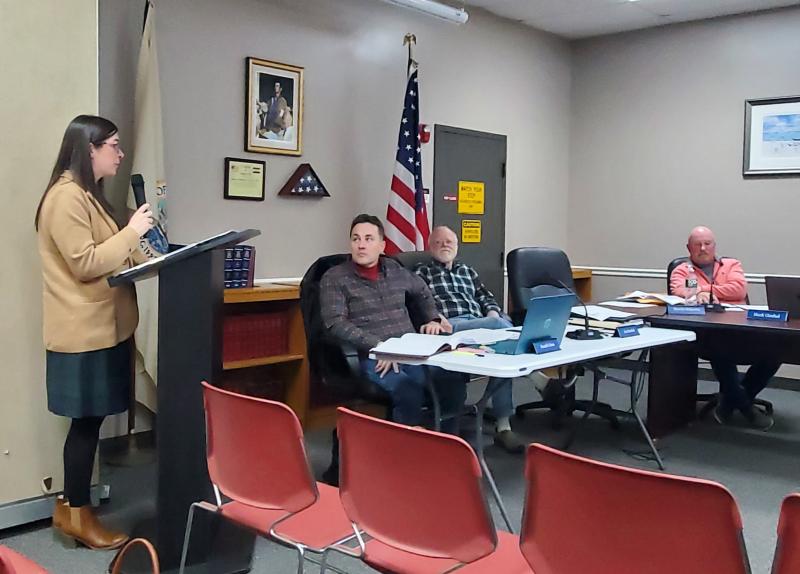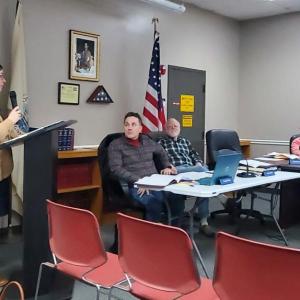Shedding light on LD 2003
After Boothbay Harbor voters rejected the controversial LD 2003 amendment at the 2023 town meeting, many were concerned about the consequences. The state has since set a later deadline for most towns to adopt the changes, but many questions and concerns remain.
Lincoln County Planner Emily Rabbe came to Boothbay Harbor for a Nov. 30 workshop between the planning board and selectboard to discuss upcoming ordinance revisions. During the meeting, she provided an update and some perspective on LD 2003.
Enacted in 2022, LD 2003 mandates some actions for local governments around housing. Under the law, municipalities may not enact ordinances that allow housing limited to one unit per lot or limit some affordable housing density bonuses. In addition, it forbids local governments from prohibiting one accessory dwelling unit (ADU) per lot. The law says ADUs are, at minimum, 190 square-foot units which may be attached, within, or separate from the primary unit. The deadline to implement the changes into town ordinances was originally July 1, 2023, but the state has since moved it back to July 1, 2024 for most communities, including all towns in Lincoln County.
“Whether we like this law or not it’s a state law and something we’re going to be subject to and need to have in our ordinance,” Planning Board Chair Tom Churchill said at the meeting.
In an interview with the Register, Rabbe said there is not an enforcement mechanism, but there could be negative legal consequences if town ordinance does not align with state law.
Rabbe said she thinks the state’s intent with LD 2003 is for it to be an impetus for municipalities to make ordinance changes to meet housing demand. In the next seven years, Maine will need 84,000 new homes, according to a 2023 study from three state agencies. The study found almost half of that need will be in coastal communities.
“(Hopefully it is) the impetus that allows towns to think a little bit more creatively about how we can increase units,” she told the Register. "Whether it is accessory dwelling units in someone's backyard or turning their house from a single-family home into a duplex or a triplex, you know that towns starting this process with LD 2003 will look and say, ‘OK, what other ordinances can we make changes to?’"
Critics say LD 2003 is an overreach of the state’s authority and limits local control. In addition, some claim ADUs would not be large enough to attract workers or families. There is also concern about the law’s wording, saying it does not prevent the additional living structures from being used as short-term rentals or at unaffordable rates.
However, Rabbe said the law gives more teeth to local governments than many expect. She said many people’s immediate reaction to LD 2003, including hers, was that the state put an emphases on property development and landowner rights, “and that's not really the case when you start to dive into the legislation. There are opportunities for municipalities to set limits,” she said.
According to Rabbe, the law does not allow people to build an accessory dwelling however they want, and ADUs still have to meet town ordinances and development requirements on issues like setbacks, lot coverage, sanitation and water supply. In addition, she said an ADU cannot supersede a private covenant.
One area where towns may also have control is short-term rentals, and members of the boards were interested in how LD 2003 applies to those. Rabbe said there is no restriction on how long an ADU can be rented under the law, but some municipalities have required they be rented out for a minimum time, such as 28 days.
Overall, Rabbe said she asks towns to consider regulating short-term rental properties, which she clarified is different than restricting them. She said towns including Wiscasset are considering having short-term rental property owners apply for a business license. Churchill said some kind of registration to figure out how many there are and where they are would be a minimal step.
However, planning board member Tom Minerich expressed concern that too many regulations would put stress on town staff and he questioned who would enforce them. Rabbe and others also expressed hesitation about changes that could affect people’s ability to make money.
“That's what I think a lot of municipalities in Maine are grappling to figure out: ‘Well, what's the fine line that we walk so that we're not infringing on someone's ability to generate additional income, but we're also not letting this run rampant and taking over our entire housing stock, and suddenly we have nowhere for people to live,’" she said.
























